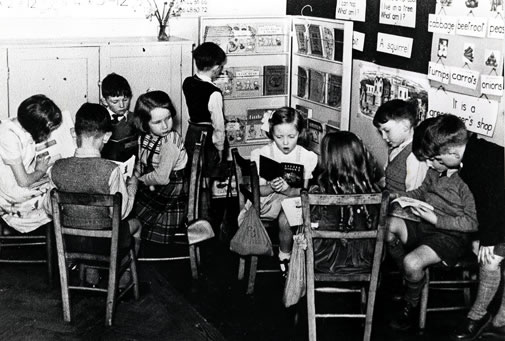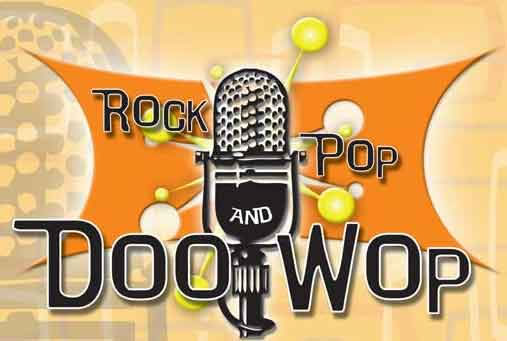DooWop Was King For Us Kids....
The music that you could understand and without the vial profanities of today
DooWop And The 50's

1951
- The white Cleveland disc jockey
Alan Freed
decides to speculate on the success of Leo Mintz's store and starts a radio program, Moondog Rock'n'Roll Party, that broadcasts black music to an audience of white teenagers
- The first rock and roll record, Ike Turner's Rocket 88, is released
- The first juke-box that plays 45 RPM records is introduced
- Howling Wolf and Joe Turner popularize the "shouters"
- Gunter Lee Carr cuts the dance novelty "We're Gonna Rock "
1952
-
Bill Haley
Saddlemen become the Comets
- Bob Horn's
Bandstand TV program
airs from Philadelphia every weekday afternoon
- The Cleveland disc jockey Alan Freed (aka Moondog) organizes the first rock and roll concert, the Moondog Coronation Ball
- Les Paul invents the first solid-body electric guitar, named the 'Les Paul', for the Gibson Guitar Company
- Sam Phillips founds
Sun Records
and declares "If I could find a white man who sings with the Negro feel, I'll make a million dollars"
-
Charles Brown's
"Hard Times" is the first hit by Jerry Leiber and Mike Stoller to enter the charts
- Little Richard's first records released
1953
- Bill Haley's "Crazy Man Crazy" is the first rock and roll song to enter the Billboard charts
- The Orioles' "Crying in the Chapel" is the first black hit to top the white pop charts
- Leo Fender invents the Stratocaster guitar
- Sam Phillips records the first
Elvis Presley
record in his Sun studio of Memphis using two recorders to produce an effect of "slapback" audio delay
- The black market constitutes 5.7% of the total American market for records
-
Vee-Jay Records
is founded in Indiana, is owned by James and Vivian Bracken, specializing in black music
- Elvis Presley makes his first (private) recordings
1954
- Boom of Doo Wop
- Bill Haley's "Rock Around the Clock" is the first rock song used in a movie soundtrack
- The record companies switch from 78 RPMs to 45 RPMs
- Japanese electronic company TTK (later Sony) introduces the world's first transistor radio
-
Ray Charles
forms his band
- In 1954, Big Joe Turner recorded the original version of the 1950s hit, Shake, Rattle and Roll.
- Johnny Cash forms the Tennessee Two with Luther Perkins and Marshall Grant,
1955
-
Chuck Berry
cuts his first rock and roll records, the first ones to have the guitar as the main instrument, and invents the descending pentatonic double-stops (the essence of rock guitar)
- Bo Diddley invents the "hambone" rhythm
- The Chordettes and the
Chantels
are the first girl-groups
- Ray Charles creates "soul" music with "I Got A Woman," a secular adaptation of an old gospel
-
Ace Records
is formed by Johnny Vincent in New Orleans, specializing in black music
- The Blackboard Jungle is released featuring Bill Haley and His Comets "(We're Gonna) Rock Around the Clock"
- RCA signs Elvis Presley
- The
Everly Brothers
make their first studio recordings
- Alan Freed's Rock 'n' Roll Ball" draws huge, half-white audience
-
Carl Perkins
records "Blue Suede Shoes"
- Sales of 45 rpm records finally outsold 78s.
1956
- Colonel Tom Parker signed on as Elvis Presley’s manager
- Heartbreak Hotel starts Presley-mania
- Presley's first film, Love Me Tender
- The rock 'n' roll music of white rockers is called
"rockabilly"
(rock + hillbilly)
- Screamin Jay Hawkins' "I Put A Spell On You" introduces voodoo into rock'n'roll
-
Wanda Jackson
is the "Queen of Rockabilly"
- The popularity of rock and roll causes the record industry to boom and allows independent labels to flourish
- In impromptu recording session occurs at Sun Studios with the million dollar quartet consisting of Jerry Lee Lewis, Carl Perkins, Elvis Presley and Johnny Cash
- Elektra pioneers the "compilation" record, containing songs by different musicians
-
Buddy Holly
had his first official recording session in 1956. It was held in Nashville at produce Owen Bradley’s, Barn Studio.
- Brenda Lee signs a recording contract at the age of 11, after five years of singing professionally
-
Gene Vincent
made his first appearance on national TV by performing on The Perry Como Show
- American Bandstand first aired on nationwide TV
1957
- Chuck Berry releases "School Day" and "Rock and Roll Music"
- Golden Age of the
teen-idols
- Link Wray's Rumble invents the "fuzz-tone" guitar sound
- Buddy Holly recorded, That’ll Be the Day, at a Norman Petty's New Mexico studio.
- Billboard begins the Hot 100 singles chart
- Buddy Holly and
Sam Cooke
made their first appearances on the same The Ed Sullivan Show
1958
- Elvis is drafted into the Army
- Carl Perkins left Sun Records in 1958,becoming the first big rockabilly artist on the Columbia label.
- Golden age of instrumental rock
-
Eddie Cochran
overdubs all instruments and vocals on "Summertime Blues" and "C'mon Everybody "
- Lowman Pauling invents guitar distortion and feedback on the Five Royales' "The Slummer"
- RCA introduces the first stereo long-playing records
-
Don Kirshner
opens offices at the Brill Building
- David Seville's "The Witch Doctor" and the Tokens' "Tonite I Fell In Love" are the first novelty hits
- Bobby Freeman's "Do You Wanna Dance" begins the "dance craze"
-
Stax Records
is founded in Memphis to promote black music
- Little Richard quit rock and roll in 1958 to attend Bible college.
-
Dion and The Belmonts
and
Laurie Records
both had their first hit when the band’s, "I Wonder Why," made the Top 40
-
Jerry Lee Lewis
had 34 of his 37 concert dates in the U.K. cancelled in 1958 when it was discovered that his new bride with him was also his 13 year old cousin.
- Buddy Holly makes his final studio recordings " It Doesn’t Matter Any More," "Moondreams," " Raining In My Heart" and "True Love Ways"
- The Dick Clark Show TV Show began
1959
- Rick Hall founds the FAME studios in Muscle Shoals, Alabama
-
The Drifters'
"There Goes My Baby" introduces Latin rhythm to pop music
-
Berry Gordy
founds Tamla-Motown in Detroit to release pop-oriented soul records
- 600 million records are sold in the USA
- Buddy Holly dies at 22 in a plane crash
- Since 1955, the US market share of the four "majors" has dropped from 78% to 44%, while the market share of independent record companies increased from 22% to 56%
- Since 1955, the US market has increased from 213 million dollars to 603 million, and the market share of rock and roll has increased from 15.7% to 42.7%
